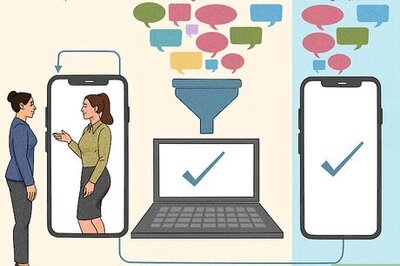
views
Washington: Advances in technology have never made finding deals this holiday season so easy - or so creepy.
Marketers and mobile app developers have developed creative new ways to help shoppers find what they want for less. But these inventive techniques also allow for more aggressive tracking of consumer behaviour, whether buyers are on their work computer, a mobile device or standing in the grocery aisle. It also now includes the ability to connect that data together and with other personal information like income, ZIP code and when a person's car insurance expires.
The goal is to monitor consumers online and off to determine exactly what kind of buyer they might be and how much they're willing to pay. Retailers say these techniques help customise shopping experiences and can lead to good deals for shoppers. Consumer advocates say aggressive tracking and profiling also opens the door to price discrimination, where companies might charge someone more online or deny them entirely based on their home price or how often they visit a site.
"You can't have Christmas any more without big data and marketers," said Jeff Chester, executive director at the Center for Digital Democracy. "You know that song where Santa knows when you've been sleeping? He knows when you're awake? Believe me, that's where he's getting his information from."
Consumer tracking has long been a part of American consumerism. Retailers push shoppers to sign up for loyalty cards, register purchased items for warranty programs and note ZIP codes to feed their mailing lists. Online stores and advertising services employ browser "cookies," the tiny bits of software code that can track a person's movements across the Internet, to analyse shoppers and present them with relevant pop-up ads.
More recently, marketers have developed increasingly sophisticated ways to combine offline and online data that creates detailed profiles of shoppers. They also are perfecting location-tracking technology as a means of attracting new customers and influencing shoppers as they wander through brick-and-mortar stores.
A major push encourages shoppers to agree to be tracked in exchange for a good deal. Brick-and-mortar stores used to balk at customers who used smartphones to compare prices at rival stores, but retailers like Target are now pushing their own mobile apps and offering in-store Wi-Fi. The mobile apps entice shoppers with coupon deals or ads as they move throughout a store, while in-store Wi-Fi is another way to track a consumer's online movements.
To further lure buyers, major holiday retailers including, Macy's, Best Buy and JCPenney, have partnered with the Shopkick mobile app. If shoppers turn on the app while in their store, they can be rewarded with discounts or song downloads for trying on clothes, scanning barcodes and making purchases.
Another app, Snapette, blends American's addiction to social media sites with location technology. Aimed at women keen on fashion, consumers can see what accessories or shoes are creating a buzz in their particular neighborhood, while stores get a chance to entice nearby shoppers with ads or coupons.
Not all new technology tracking is voluntary. Stores have been experimenting with heat sensors and monitoring cellphone signals in their stores to monitor which aisles attract the most attention. One product called "Shopperception" uses the same motion-detection technology in the Xbox Connect to pick up a customer's movement, including whether they picked up a product only to return it to the shelf. In addition to analysing customer behavior, it can trigger nearby digital signs offering coupons and steering shoppers to certain products.
The company contends that the technology is less intrusive than other tracking devices, including security cameras, because a person's image is never stored and their movements only registered as a data point.
Marketers also are learning to overcome limitations with software cookies. One tech startup called Drawbridge claims to have found a way to link a person's laptop and mobile device by analysing their movements online, enabling advertisers to reach the same consumer whether they're on their work computer or smartphone.
But how all that information is used and where it ends up is still unclear. The Federal Trade Commission, along with several lawmakers, has been investigating the "data broker" industry, companies that collect and sell information on individuals by pooling online habits with other information like court records, property taxes, even income. The Government Accountability Office concluded in November that existing laws have fallen behind the pace of technological advancements in the industry, which enables companies to aggregate large amounts of data without a person's knowledge or ability to correct errors.
"There are lots of potential uses of information that are not revealed to consumers," said Susan Grant, director of consumer protection at the Consumer Federation of America. To protect themselves, "consumers still need to do quite a bit of shopping to make sure that they get (what) meets their needs the best and is the best price."




















Comments
0 comment